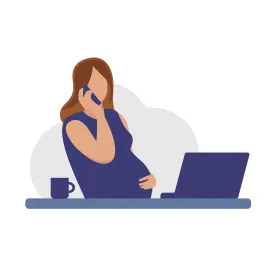The U.S. Equal Employment Opportunity Commission (EEOC) has published its proposed regulations to implement the Pregnant Workers Fairness Act (PWFA) in the Federal Register. The PWFA, which became effective on June 27, 2023, requires employers to provide reasonable accommodations to employees and applicants suffering limitations from pregnancy, childbirth or related medical conditions. The proposed regulations now enter the 60-day notice and comment period before the final version will be published into law. The PWFA requires the EEOC to issue final regulations by December 29, 2023.
Notably, the regulations proposed by the EEOC take broad views as to who qualifies for protection and employers’ requirements to provide accommodations. While the regulations use similar terminology as the Americans with Disabilities Act (ADA) and its accompanying regulations, the definitions and applications are significantly different in some areas.
Employers have to accommodate qualified employees with known limitations due to pregnancy, childbirth and related conditions, unless it causes an undue burden. Unlike with the ADA, an employee or applicant does not have to show that a limitation reaches a certain level of severity or duration. Additionally, the employee does not need to be capable of performing the essential job functions to be a “qualified” individual. An employee may be qualified if:
the inability to perform an essential job function is for a temporary period;
the essential job function(s) could be performed in the near future; and
the inability to perform the essential function(s) can be reasonably accommodated.
The proposed regulations note that the following accommodations will be a reasonable accommodation that does not create an undue hardship in “virtually all cases:”
allowing an employee or applicant to carry water and drink as needed during the workday;
allowing an employee or applicant additional restroom breaks;
allowing an employee or applicant whose work requires standing to sit and whose work requires sitting to stand; and
allowing an employee or applicant breaks, as needed, to eat and drink.
In addition, leave, including intermittent and reduced schedule leave, may be a reasonable accommodation even if the employer does not offer it or the employee has exhausted the leave available.
As with the ADA, an employer does not have to accommodate an employee if the accommodation will create an undue hardship. An undue hardship means accommodation will cause the employer significant difficulty or expense. The proposed regulations note that a covered entity must conduct a case-by-case assessment to determine if the accommodation will cause an undue hardship.
Regarding documentation, the proposed regulations provide that employers may only ask for reasonable documentation when it is reasonable under the circumstances to determine whether to grant the accommodation. An employer is not permitted to require documentation when the limitation and need for reasonable accommodation are obvious. If a worker, who is obviously pregnant and confirms their pregnancy, requests a reasonable accommodation, the employer can ask for documentation supporting a non-obvious limitation, but not for confirmation of the pregnancy.
Recommendations for Employers
At this time, the PWFA is in effect and the EEOC is accepting charges from employees. However, the proposed regulations are not yet in effect and will not be finalized until the end of the comment period. Employers who oppose or support the regulations still have an opportunity to submit a comment for the EEOC’s consideration.
In the interim, employers should:
Review the proposed regulations and examples to better understand how the EEOC intends to interpret the PWFA.
Analyze their current policies and procedures to determine if they are in compliance with the PWFA and the proposed regulations.
Prepare to implement any changes that need to be made to policies, forms or practices to comply with the PWFA if the regulations are adopted in their current form.
Post the required PWFA notices.
Consider preparing training for Human Resources employees, supervisors and managers regarding the PWFA and how to identify and respond to requests for accommodations.



 />i
/>i
